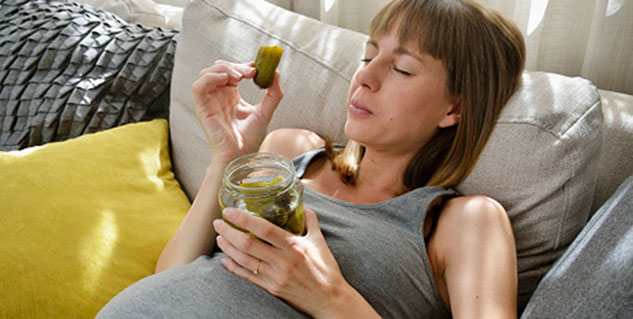Pregnant women need to structure their food chart to ensure their healthy being and their baby’s too. A requisite food chart encompasses foods that pregnant women should eat in order to fulfil nutritional needs. In pregnancy dietary regimen, woman should never go with notions such as 'eating for two'.

Foods for pregnant women
Food chart for pregnant women should have variety of foods from food groups mentioned below:
Top Stories
Protein sources
Cereals, whole grains, pulses and nuts should be included in pregnancy diet plan. Proteins help build muscle, tissue, enzymes, hormones and antibodies for mother and her unborn baby. Among other protein sources expectant mothers can have are cooked lean meat, poultry and fish.
Dairy products
Skimmed milk and other dairy products such as yoghurt, cottage cheese and buttermilk should be an integral part of pregnancy diet. These provide expectant mothers with essential nutrients such as calcium, protein and Vitamin B-12. If a woman is lactose intolerant, she should consult health care provider for alternative source.
Fresh vegetables and fruits
A pregnancy diet chart should have a lot of spinach, broccoli, bananas, oranges, tomatoes and leafy green lettuces. These foods are full of nutrients, such as vitamins C and E (reduce the risk of eclampsia). Broccoli and spinach are excellent sources of folate, calcium and iron. Bananas are high on potassium, which help expectant mothers fight pregnancy fatigue and nauseous stomach. Orange has vitamin C, folate and fibre, which helps to meet everyday requirement of fluids and energy.
Avocados
Avocados are nutritious fruits that are helpful for meeting the dietary needs during pregnancy. With a single cup of avocado you get approximately 240 calories. It is a rich source of vitamin C, vitamin B6, potassium, vitamin E, vitamin K, folate and fibre.
- Being a rich source of folic acid, they help in the neural and cognitive development of your baby.
- Vitamin C present in the avocado helps in strengthening the immune system, thus helping to deal with injuries and wounds.
- Vitamin K facilitates blood flow and safeguards your baby from developing blood disorders.
- Folates are helpful for preventing birth defects. They are one of the best nutrient foods for pregnant women.
- Avocados also have fibres that help in appropriate absorption of other nutrients as well.
Legumes
Beans, dried beans, peas, lentils and soybeans are good sources of folic acid (folate), an essential nutrient to develop baby's neural tube. The neural tube of foetus develops during first month of pregnancy and later into baby's brain and spinal cord. Moreover, legumes are high in iron, which is necessary for development of red blood cells to carry oxygen throughout the body. Legumes are helpful to combat pregnancy signs, such as fatigue, irritability and depression during pregnancy.
Whole grains
Whole grain foods provide rich in folic acid, calcium, fibre, zinc, Vitamin E, iron, and vitamin B1, B2, B3 and B6. These foods relieve pregnancy discomforts, aid digestion and fight morning sickness.
Fluids
Water and fresh fruit juices are essential to keep unnecessary infections and illnesses at bay.
Olive oil
Olive oil is a great source of healthy fats required during pregnancy. Since it contains fatty acids, it is beneficial for the neural development of the baby. It may be surprising to know but olive oil can also help in keeping a check on excessive weight during the entire course of pregnancy.
Other sources of healthy fats include nuts, coconut oil and organic butter.
Eggs
- As the pregnancy progresses, it becomes essential to increase the intake of proteins. Eggs are an excellent source of protein and the best part is that they are easily available. They also deliver essential amino acids and Omega-3 fatty acids.
- Experts suggest that a pregnant woman must include two eggs in her daily diet. If you are including eggs in your diet then you are aiding the overall development of your baby, especially of the brain and retina.
A pregnant woman should remain on a healthy diet throughout her pregnancy period which is enriched with much-needed vitamins and minerals, especially folic acid and iron, along with adequate proteins, vegetables, fruits, grains and dairy products. Moreover, food chart for pregnant woman must take care of caloric intake during pregnancy. In a nutshell, pregnancy diet is all about what you eat.
Filtered water
Drink a lot of water during pregnancy. Water not only helps you to stay hydrated, it also flushes out toxins and other impurities from your body.
Consume food rich in iron
Iron is a must for a woman’s body during pregnancy. It is vital for producing all the blood needed to supply nutrients to the placenta. Try to include green vegetables in your pregnancy diet. Veggies such as broccoli and spinach are excellent sources of iron. Muesli and wholemeal bread are the other iron rich foods.
Iron is best absorbed by the body when it is taken with vitamin C (can be taken in the form of juice of citrus fruits).
Image source : Getty
Read more articles on Pregnancy
For more such stories, Download Onlymyhealth app
